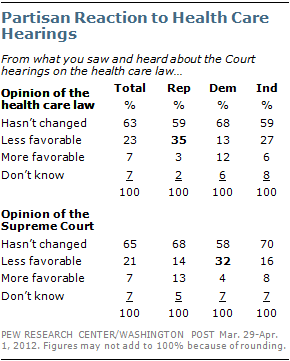WASHINGTON -- Last week's Supreme Court oral arguments on the 2010 health care law appear to have generated negative reactions to both the law and the Court, according to findings from a new Pew Research Center/Washington Post national survey measuring public reactions to last week's legal proceedings.
The survey asked a random sample of 1,000 adults nationwide whether what they "saw and heard" about the Supreme Court's hearings made them feel more or less favorable toward the health care law and the Supreme Court. Large majorities reported no change -- 63 percent said their views of the health care law were unaffected, 65 percent said they had not changed their views of the Court.
However, among those reporting a shift, most said their views had become more negative. Specifically, the number who said their opinion of the Supreme Court had grown less favorable (21 percent) was three times the number who said their impression had grown more positive (7 percent). Similarly, far more reported that their opinions of the health care law became less favorable (23 percent) than more favorable (7 percent).

Not surprisingly, political partisanship played a significant role in mediating these reactions. Democrats reported mostly that they developed more negative reactions to the Court (32 percent less favorable, 4 percent more favorable), but split on the health care law itself (12 percent more favorable, 13 percent less favorable). Meanwhile, Republicans were split on their reaction to the Court (14 percent more favorable, 13 percent less), while the majority reported that their opinions of the health care law became less favorable (35 percent less favorable, 3 percent more).
The Washington Post reported that Americans who said they followed the hearings "closely" were most likely to report a changed opinion, although Pew Research has not yet published the total number who said they followed oral arguments closely.
When released, those results should serve as something of a reality check, as polls show that few Americans typically pay close attention to the Supreme Court's activities. The best evidence of that lack of engagement comes from another Pew Research survey conducted in July 2010 that found that, as an institution, the Supreme Court is "largely out of sight and out of mind" for the American public. It found, for example, that just 28 percent could correctly select John Roberts from a list of four names as the chief justice of the Supreme Court (18 percent selected an incorrect name and 53 percent were uncertain).
In the days following last week's oral arguments, legal analysis and political pundits debated what the potential impact could be if the Supreme Court were to overturn the Affordable Care Act.
Author and CNN analyst Jeffery Toobin, for example, argued that a Supreme Court defeat for Obama "would be a disaster for his chances to win again" and "would mark Obama as a loser in a significant and dramatic way."
Veteran Democratic campaign consultant James Carville saw it very differently, predicting last week that a Supreme Court defeat would be "the best thing that ever happened to the Democratic party." Why? "Health care costs are gonna escalate unbelievably," Carville told CNN's Wolf Blitzer, and "then the Republican Party will own the health care system for the foreseeable future." He predicted that a defeat would allow Democrats to say, "we tried, we did something," and a "5-4 Supreme Court majority" stopped us.
This speculation gets a bit ahead of the Supreme Court's actions so far, since the Court has not yet ruled on the constitutionality of the health care law. It also concerns the political impact on President Barack Obama, while the new Pew Research questions involve the image of the Supreme Court and the law itself.
It would not be surprising if last week's events produce a modest downturn in opinions of the health care reform law, since the Supreme Court arguments focused heavily on the provision of the law that requires Americans to purchase health insurance. As the Pew Research Center reported last week, the individual mandate provision is "deeply unpopular with the American public," with 66 percent reporting an unfavorable opinion of it on a recent Kaiser Family Foundation survey.
But with that said, the partisan nature of the reactions measured on this initial Pew Research survey suggests that many of those who say their opinions of the Court or the health care law changed had already made their minds up about the law.
The ultimate political impact will depend on how the Supreme Court rules, of course, and will likely require more than a handful of survey questions to assess.
